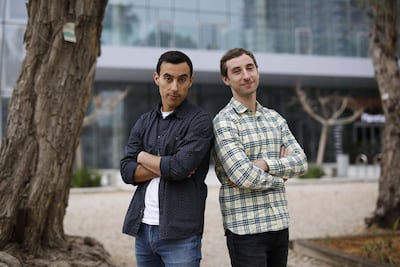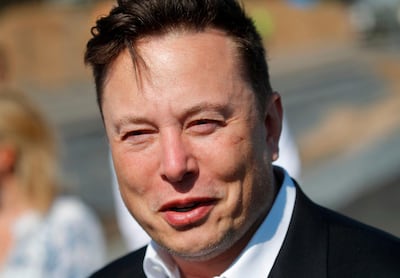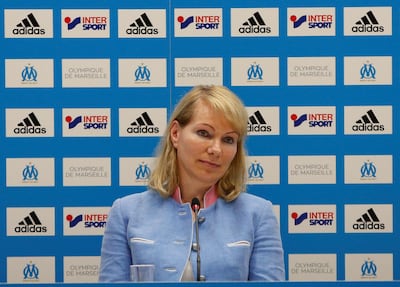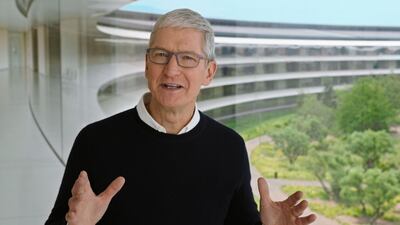Tim Cook
Apple said it is giving chief executive Tim Cook new equity awards that could provide him with as many as 1 million shares by 2025.
The compensation, currently worth $76m to $114m depending on Apple’s share performance, gives Mr Cook a new reason to keep running the world’s largest technology company.
The equity comes in two packages, according to a regulatory filing. The first comprises 333,987 restricted stock units that vest in thirds on April 1 in 2023, 2024 and 2025. The other has 333,987 units that will vest on October 1, 2023 and is based on Apple’s relative share performance over three years. Mr Cook may get none of this award or 200 per cent, depending on stock returns. If all goes well, Mr Cook would get about 1 million shares in total.
“Tim has brought unparalleled innovation and focus to his role as CEO and demonstrated what it means to lead with values and integrity,” Apple’s board said in a statement. “For the first time in nearly a decade, we are awarding Tim a new stock grant that will vest over time in recognition of his outstanding leadership and with great optimism for Apple’s future as he carries these efforts forward.”
Apple shares have soared in recent years as Mr Cook helped the company churn out new iPhones, watches, AirPods and digital services, while fending off the impact of US-China trade tensions and a global pandemic. The executive became a billionaire earlier this year, but he has been giving away some of that wealth.
The new packages mark the first equity awards issued to Mr Cook since he was named chief executive in 2011. Mr Cook, 59, has given no indication he plans to step down, but succession planning has been a major point of discussion in recent Apple board and executive team meetings.
A few weeks ago, Mr Cook was asked how long he foresees running the Cupertino, California-technology giant. “We’ll see,” he said. “At some point, of course, we all do something different.”

Igor and Dmitry Bukhman
The coronavirus pandemic has created a new gaming giant, boosting the fortune of its two founding brothers.
Thanks to a rush of new gamers, Playrix has become the world’s largest mobile-game developer after Tencent Holdings, according to researcher AppAnnie. Its founders and sole owners, 38-year-old Igor and Dmitry Bukhman, 35, have more than doubled their wealth and are now worth $3.9 billion each, according to the Bloomberg Billionaires Index.
That didn’t happen by accident. At the height of the health crisis, as companies cut down on advertising, the mobile-game developer took advantage of lower ad prices to increase its marketing. Monthly users surged 50 per cent to 180 million at the peak of the outbreak, and sales jumped about 60 per cent to $1.75bn in the first eight months of the year, the company said. The number of gamers has since stabilised at 150 million monthly.
“Successful games have become long-term services similar to Netflix, which manages to retain users by constantly adding new content,” Igor said. “We are constantly adding new stories, different game mechanics and levels to our games, and people are playing them for years.”
Listed gaming companies from China’s Tencent to Zynga in the US, CD Projekt in Poland and Netmarble in South Korea have surged this year with people spending more time and money playing. But Playrix’s rise to No. 2 from No. 7 last year is remarkable for two brothers native of Vologda, a city north of Moscow.
Playrix now employs more than 2,500 people. It has personnel at its Ireland headquarters and developers in Russia and Eastern Europe. In the past two years, the firm has bought a dozen developers and it’s now counting on them to help it produce new hits.

Elon Musk
Tesla chief executive Elon Musk plans to list SpaceX’s space internet venture, Starlink, several years in the future when revenue growth is smooth and predictable.
“Public market does *not* like erratic cash flow haha,” the billionaire entrepreneur tweeted.
Mr Musk said last year that Starlink was an important new revenue stream for his California-based Space Exploration Technologies, or SpaceX.
SpaceX president Gwynne Shotwell in February floated the idea of spinning Starlink off for an IPO in the coming years.
SpaceX is racing to build out its Starlink satellite constellation to offer broadband internet commercially by the end of 2020.
Mr Musk, in his tweet, also said he is a “huge fan” of small retail investors and will ensure they get top priority.

Margarita Louis-Dreyfus
Margarita Louis-Dreyfus took another hefty dividend from the eponymous agricultural-commodity trading house she controls, as the billionaire continues to squeeze the business for cash.
During the first six months of the year, Louis Dreyfus Company paid a dividend of $302m. The payout related to last year’s profit, the sale of several assets in Canada and its former metals-trading business, according to the company’s interim financial statement. The dividend reduced the company’s equity to $4.48bn at the end of June, down from $4.79bn six months earlier.
Ms Louis-Dreyfus, who controls more than 96 per cent of the holding company that owns LDC, has been taking big dividends over the past few years to help repay about $1bn she borrowed to buy out other family members.
The billionaire owner has been in talks to sell a minority stake in the company, recently holding negotiations with Abu Dhabi holding company ADQ. A successful deal would give the trading house an injection of much-needed cash.
On top of its owner’s troubles, the company has struggled in recent years, amid frequent management changes and declining earnings.
Despite its recent travails, the first half of 2020 showed some improvement for LDC. Net income climbed 77 per cent to $126m from a year earlier, despite significant losses from the collapse of Luckin Coffee. Net sales decreased to $16.3bn, as both prices and volumes shipped fell year on year.

